Monday, April 22, 2013
 Today more than one billion people will take part in the 43rd anniversary of Earth Day. Across the globe, individuals, communities, organizations, and governments will acknowledge the amazing planet we call home and take action to protect it. This year’s theme is “The Face of Climate Change.” The Earth Day Network plans to collect and display images of people, animals, and places directly affected or threatened by climate change – as well as images of people stepping up to do something about it. On and around Earth Day, an interactive digital display of all the images will be shown at thousands of events around the world. The display will also be made available online to anyone who wants to view or show it.
Today more than one billion people will take part in the 43rd anniversary of Earth Day. Across the globe, individuals, communities, organizations, and governments will acknowledge the amazing planet we call home and take action to protect it. This year’s theme is “The Face of Climate Change.” The Earth Day Network plans to collect and display images of people, animals, and places directly affected or threatened by climate change – as well as images of people stepping up to do something about it. On and around Earth Day, an interactive digital display of all the images will be shown at thousands of events around the world. The display will also be made available online to anyone who wants to view or show it.
As one of the grandfathers of the environmental movement, Lester Brown is an original “face of climate change,” writing about population, food, and land issues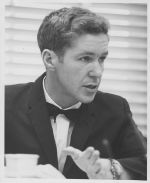 in the early 1960s when he was at the U.S. Department of Agriculture. Shortly after earning a degree in agricultural science from Rutgers University in 1955, he spent six months living in rural India where he became intimately familiar with the food/population issue. He then earned a master’s degrees in agricultural economics from the University of Maryland.
in the early 1960s when he was at the U.S. Department of Agriculture. Shortly after earning a degree in agricultural science from Rutgers University in 1955, he spent six months living in rural India where he became intimately familiar with the food/population issue. He then earned a master’s degrees in agricultural economics from the University of Maryland.
Lester’s most recent book Full Planet, Empty Plates: The New Geopolitics of Food Scarcity exposes the increasingly volatile food situation the world is facing. The newest challenge confronting farmers is climate change. The massive burning of fossil fuels is increasing the level of carbon dioxide in the atmosphere, raising the earth’s temperature and disrupting climate. It is now in a state of flux. Historically when there was an extreme weather event—an intense heat wave or a drought—we knew it was temporary and that things would likely be back to normal by the next harvest. Now there is no “norm” to return to, leaving farmers facing a future fraught with risk.
The environmental movement is making bigger waves than ever and although the faces may have changed, the message is still the same: we cannot continue with business as usual. As we say here at the Institute, pick an issue and get to work on it. Perhaps it is getting a world-class recycling center operating in your community. Or it might be writing and talking to political leaders about the need for a carbon tax. Our People in Action page gives some examples of what people have done. In the meantime, look for an Earth Day event near you!
Best,
Julianne
Wednesday, April 17, 2013
During this week marked by tragedy, we thought it might be nice to share some good news. Last week we celebrated Matt Roney’s pending fatherhood. He and his wife, Sara, are soon to be parents to twins—a girl and a boy.
Matt is an associate researcher whose focus is on renewable energy and the food system. Both issues can be tough to tackle, but we’re guessing it might be a little more challenging to care for newborn twins.
The EPI staff gave some helpful gifts including a baby carrier, bath toys, blankets, booties, books for the parents and the babies, and even some homemade sweaters.
The babies are due in the middle of May and we are anxiously awaiting their arrival. Our advice to Matt: get your sleep now while you can!!
Best,
Julianne
Tuesday, March 19, 2013
We love hearing about how our publications inspire others to take action and share their stories on our website. From the classroom to the political arena, in 2012 people spread the word about Plan B and EPI’s work to create a roadmap to sustainability.
Impressed with the film version of Plan B, the Guemes Island Environmental Trust in Anacortes, Washington created an essay contest for high school aged youth. The essay challenge topic was, “What is the biggest threat to humans from climate change and how will you engage your friends to turn it around?” Contestants were also required to respond to the documentary, “Plan B, Mobilizing to Save Civilization.” Local schools and other organizations were contacted to promote responses from youths 15 to 20 years of age. They raised funds to provide awards which were presented for the top four essays at the Anacortes Library on May 25, 2012.
Andy Kunz, President and CEO of the US High Speed Rail Association (USHSR), posted the Plan B film on the association's home page this year, sent out notifications about it, and mentioned it in major news releases. He said, "Congratulations on making such an important film. We will do everything we can to spread the word far and wide!"
George A. Macpherson has written a novel based around Lester Brown’s Plan B. The Glebe Field is a romance centered around a young couple starting a Plan B for Action foundation and a legal fight between them and developers. Read more.
Makis Fountoulis, who publishes our books in Greece, has also been promoting them through lectures about World on the Edge and Plan B. Last year, he helped get 350 copies of World on the Edge delivered as Christmas gifts. He has given a number of lectures including one recently to a large gathering at the Athens Municipality Cultural Center. He has also been in contact with the Ministry of Education and plans to start giving lectures to high school students.
In honor of their father who unexpectedly passed away, the Sloan brothers are distributing copies of Full Planet, Empty Plates to members of Congress. In their letter accompanying the book they wrote, “The enclosed book, Full Planet, Empty Plates: The New Geopolitics of Food Scarcity by Lester Brown of the Earth Policy Institute, contains the best analysis of what Chuck Sloan inherently knew. The 21st century will not mirror the 20th century. While the latter was witness to resource abundance and consumption, the former will be defined by resource scarcity.”
Doris and Lars Almstrom are busy translating Full Planet, Empty Plates into Swedish. At the same time they are spreading the Plan B movement through newsletters, organizing gatherings, giving lectures, and doing whatever else to promote action for change. (For some examples, click here). Meanwhile, the EPI books they’ve already published are being used as textbooks in several universities in Sweden. And throughout the country people are organizing study circles to read the Plan B books.
Check out more of these inspiring stories on our People in Action page.
We are grateful to these and many others who regularly repost, reprint, excerpt, and otherwise distribute our publications. Change requires information and we work to provide carefully documented research in ways that will inspire global change.
If you have a story to share with us, we’d love to hear from you!
Best,
Julianne
Wednesday, January 23, 2013
 EPI had the pleasure of honoring President Obama at the Green Inaugural Ball on Sunday. The ball was an opportunity to bring together the broad environmental, conservation, and clean tech community to celebrate the past four years and look forward to the future. EPI was thrilled to be a member of the host committee, so we put on our Sunday best and braved the cold D.C. streets the night before inauguration.
EPI had the pleasure of honoring President Obama at the Green Inaugural Ball on Sunday. The ball was an opportunity to bring together the broad environmental, conservation, and clean tech community to celebrate the past four years and look forward to the future. EPI was thrilled to be a member of the host committee, so we put on our Sunday best and braved the cold D.C. streets the night before inauguration.
The event took place on the seven floors of the Newseum in downtown Washington D.C. and featured performances by seven-time Grammy Award winner will.i.am, master trombonist Trombone Shorty, and soul singer Mayer Hawthorne with appearances by EPA Administrator Lisa Jackson, "Damages" actor Tate Donovan, "Breaking Bad's" Giancarlo Esposito, and Bill Nye "The Science Guy," a crowd favorite.
The highlight of the night though was a surprise appearance by Vice President Joe Biden. “I came to say thank you,” Biden said. “I also came to tell you what my green wish is: that we finally face up to climate change.” Little did we know that the President himself would reiterate the need to fix climate change the next day in his inaugural address.
 Along with the celebrity appearances, EPI staff enjoyed the elevator bars—that’s right bars in the elevators—where the event’s exclusive signature cocktail, the OM-bam
Along with the celebrity appearances, EPI staff enjoyed the elevator bars—that’s right bars in the elevators—where the event’s exclusive signature cocktail, the OM-bam a was served, appetizers by Wolfgang Puck, with 98% of the ingredients on the menu procured from within 300 miles, and the freedom to explore the exhibits of the Newseum. It was a truly unforgettable night for the staff, our families, and fellow environmentalists, and we are looking forward to what the next four years bring.
a was served, appetizers by Wolfgang Puck, with 98% of the ingredients on the menu procured from within 300 miles, and the freedom to explore the exhibits of the Newseum. It was a truly unforgettable night for the staff, our families, and fellow environmentalists, and we are looking forward to what the next four years bring.
Best,
Julianne

p.s. There's a great Huffington Post article with their coverage of the event and more pictures.
Tuesday, January 08, 2013
Outreach is an essential part of the mission of the Earth Policy Institute (EPI). Our in-house team of two works to get EPI's research into the hands of those who can use it.

Publishing and Book Releases
Our books are the foundation for reaching a global constituency. Thus far our books have been published in 33 languages. Major languages (more than 50 million speakers) include English, Arabic, Chinese, Farsi, French, German, Hindi, Indonesian, Italian, Japanese, Korean, Marathi (India), Polish, Portuguese, Russian, Spanish, Thai, Turkish, and Ukrainian. Other languages include Bulgarian, Catalan, Czech, Croatian, Danish, Dutch, Esperanto, Greek, Hungarian, Malayalam, Norwegian, Romanian, Slovenian, Swedish, and Vietnamese for a total of 137 contracts.
Whenever possible Lester Brown likes to launch the various language editions. Early in 2012 he was inducted into the Kyoto Environmental Hall of Fame. While in Japan, he launched the Japanese edition of World on the Edge. From Japan, he flew to Beijing to launch the Chinese edition. In October he launched the Spanish edition in Colombia via video. And in late November, he launched the Dutch and Italian editions of Full Planet, Empty Plates. In addition to launching books, he spoke at a conference on energy hosted by the New York Times. Harvard University gave him their first Environmental Alumni Award. And the University of Maryland asked him to give the inaugural talk for a new environmental lecture series. He also spoke at the 40th anniversary event for the Club of Rome’s “limits to growth” and at a major food conference in Milan.
Media Outreach
We work closely with the world's major news organizations. Since we opened our doors in May 2001, we have generated over 46,000 news clips, about 17 each weekday. Institute researchers have given some 600 interviews for radio and television, including national and international networks such as ABC, NBC, Bloomberg, the BBC World Service, Voice of America, CNN International, Al Jazeera, CCTV (China), NHK TV (Japan).
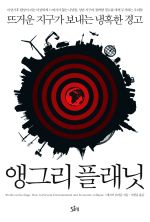
This year, we boldly entered the visual world by making a video summary of Full Planet, Empty Plates. This five-minute clip has been posted to the Institute website as well as on the sites for Barnes & Noble, Goodreads, W.W. Norton, and the many blogs where EPI usually posts research. Our international publishers are now beginning to post the video on their sites as well. We also are posting shorter clips on specific subjects from the book.
Plan B Teams
With the original Plan B, over 700 individuals bought a copy, read it, and then became personally engaged, buying 5, 10, 20, or even 50 or more copies for distribution to friends, colleagues, and political leaders. They became EPI’s Plan B Team. The release of Full Planet, Empty Plates swelled the number of team members to some 4,000. Some members purchase copies and then return to purchase more. Ted Turner is the de facto captain with his distribution of some 4,200 copies to the Fortune 500 CEOs, state governors, Congress, university presidents, heads of state, ministers of environment, ministers of energy, ministers of agriculture, heads of the major environmental NGOs, the major media outlets, and, perhaps most importantly, to each of the world’s billionaires.
Website
EPI incorporates Web 2.0 tools into its media outreach and communications marketing strategy to disseminate releases, data, and any information that the research team releases for the public. Included in these tools are blogs, RSS feeds, public and media listservs (containing some 14,321 and 1,813 addresses respectively), networking sites, podcasts, Twitter, and a micro-blogging site. This year also included the successful launch of EPI’s mobile website, designed specifically for mobile devices.
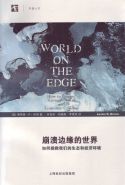
Twitter has become an essential tool for promoting events, releases, and our books. With 10 posts per week on average and around 125 followers added each month, we now have nearly 4,000 followers. Our Facebook Fan Page has also grown to some 6,000 fans. Our newest social media venture is Pinterest, a virtual bulletin board. On this visual site, we post photos of EPI’s books, graphs that accompany our releases, and videos. We are excited to see what this new venture brings.
Twitter and Facebook are consistently among the top referrals back to our website, along with international Google search engines and EPI’s Wikipedia page. When Googling for issues on which we work, EPI is often at the top of the list due in large measure to the over 275,000 links to our website. As to be expected, our publications and data are a major attraction. On average, EPI’s website has 24,000 unique visitors per day spending about 11 minutes per session.
We live-tweet our press conferences, providing an easily accessible channel for journalists. Prominent reporters and their affiliated news organizations repost EPI content, creating a multiplier effect. Notable reporters include David Roberts of Grist, who posts direct links to EPI’s website regularly, Anca Novacovici of the Huffington Post, and John Vidal of the Guardian. Other notables who retweet and re-post include Daryl Hannah, Sean Ono Lennon, Occupy Wall Street, Earth Business Network, Greenpeace USA, Sierra Club’s Beyond Coal Campaign, Sustainablog, and Treehugger.
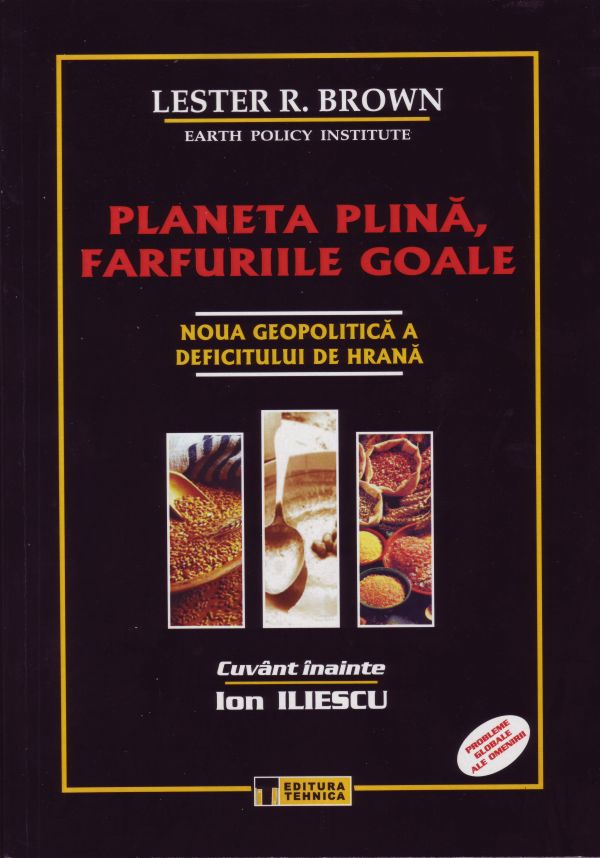
Podcasts of our releases and book chapter introductions generate an average of 280 monthly downloads. The most downloaded podcasts in 2012 were the press teleconference for the release of Full Planet, Empty Plates, and the Update on meat consumption in China, and the Indicator on wind power. (Click here for our newest podcast.)
And last, through our blog, we give readers insight into the Institute beyond its research. For instance, in addition to the blogs on World Water Week and Rio+20, were ones on the completion of EPI’s mobile website and new shopping cart, Lester’s trip to Harvard to receive the first-ever Alumni Environmental Sustainability Award, how some people are working with Plan B, and Matt Roney’s graduation from Johns Hopkins University with a Master of Science degree.
We are grateful that our publications are regularly reposted, reprinted, excerpted, and otherwise distributed. Change requires information and we work to provide carefully researched information in ways that will inspire global change.
Sincerely,
Reah Janise Kauffman
Wednesday, December 26, 2012
With the pressure of writing two books this year, Lester Brown has kept his travel to the bare minimum. Nevertheless, he managed a weeklong trip to Europe following Thanksgiving.
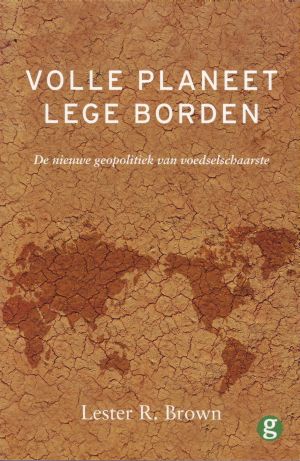 His first stop was The Netherlands where he launched the Dutch edition of Full Planet, Empty Plates. The publisher, Maurits Groen, who owns an environmental consultancy, has been a fan of Lester’s work for some time. Recently Maurits’ company developed a solar lamp, called Waka Waka, to be used in Africa to replace the dangerous kerosene lamps used by many households in the developing areas. Lester also spoke at the Waterproof conference, focusing on the water-food-energy nexus.
His first stop was The Netherlands where he launched the Dutch edition of Full Planet, Empty Plates. The publisher, Maurits Groen, who owns an environmental consultancy, has been a fan of Lester’s work for some time. Recently Maurits’ company developed a solar lamp, called Waka Waka, to be used in Africa to replace the dangerous kerosene lamps used by many households in the developing areas. Lester also spoke at the Waterproof conference, focusing on the water-food-energy nexus.
Next stop was Brussels where Frank Schwalba-Hoth, former member of the Green Party, arranged an excellent program for Lester, which included speaking at the European Parliament. Lester spoke about the new geopolitics of food scarcity.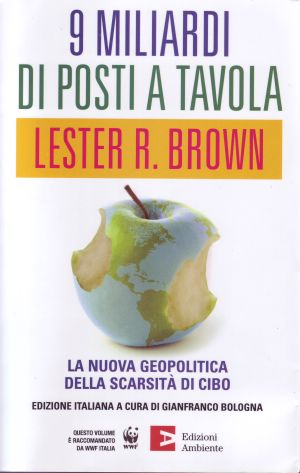
Finally Lester landed in Milan where he gave a keynote address at Barilla’s 4th Annual Forum on Food and Nutrition. The video is available on their website. (Go to the Nov 29 tab. There are 4 pages of videos. Lester’s is on the third page.) Following his keynote, he autographed copies of the Italian and English editions of Full Planet, Empty Plates and gave a presentation on the book.
Friday morning he spoke at the IULM University in Milan followed by an afternoon presentation at the University of Bologna. The Italian press interviewed Lester before he left on the trip and during. Our thanks to Barilla for inviting Lester to speak and to our publisher Edizioni Ambiente.
Next stop for Lester is a visit to his family for the holidays.
Happy Holidays to all!
Reah Janise Kauffman
Wednesday, December 19, 2012
In this spot, we often talk about happenings at Earth Policy other than our research. But at this time of the year, we wanted to give you a sense of what our research team has produced in 2012.
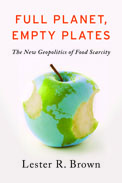 Two major activities have kept the research team hopping this year. The first centered on research for Full Planet, Empty Plates: The New Geopolitics of Food Scarcity, the book by Lester Brown that was released at a press teleconference on September 28, just two months after delivery to W.W. Norton & Company. Belying the book’s short page length (123 pages) is a mountain of data and resources supporting each fact, all of which have been posted on our website. The second major activity has been researching new Data Highlights, Plan B Updates, and Eco-Economy Indicators, along with Book Bytes, and two PowerPoint presentations summarizing Full Planet, Empty Plates.
Two major activities have kept the research team hopping this year. The first centered on research for Full Planet, Empty Plates: The New Geopolitics of Food Scarcity, the book by Lester Brown that was released at a press teleconference on September 28, just two months after delivery to W.W. Norton & Company. Belying the book’s short page length (123 pages) is a mountain of data and resources supporting each fact, all of which have been posted on our website. The second major activity has been researching new Data Highlights, Plan B Updates, and Eco-Economy Indicators, along with Book Bytes, and two PowerPoint presentations summarizing Full Planet, Empty Plates.
The major theme of the book is that we are entering an era of food scarcity that is leading to intense competition for control of land and water resources—a new geopolitics of food. This new era is visible in dangerously low levels of grain stocks and the deepening of hunger, with some families resorting to scheduling foodless days each week. While some 3 billion increasingly affluent people are moving up the food chain, consuming more grain-intensive livestock and poultry products, climate change, water shortages, crop-shrinking heat waves, and the diversion of grain to fuel cars are making it more difficult for farmers to keep pace with demand.
The tightening grain situation has led many grain-importing countries to buy or lease large tracts of land in other countries to grow food for themselves, often in countries whose populations receive assistance from the U.N. World Food Programme. This onslaught of land acquisitions has now become a land rush as governments, agribusiness firms, and private investors seek control of land wherever they can find it. Many of the land deals are made in secret, and much of the time the land involved is already being farmed by villagers, who are summarily displaced. The potential for conflict is high.
Meanwhile, a second book has been taking shape: Lester’s autobiography, Breaking New Ground: A Personal History. Staff have been engaged in compiling Lester’s speaking engagements for the past 50 years, going through old files from his USDA, Overseas Development Council, and Worldwatch Institute days, and compiling a chronicle of his life through photographs. (We are looking at a late October/early November 2013 release, so stay tuned!)
Books notwithstanding, the research team has been mindful of global environmental trends. For instance, with the drought and heat toasting much of the country, the team closely monitored the corn crop. On July 19, EPI held a press teleconference where Lester stated that the USDA’s estimate of a corn harvest shortfall of 12 percent was likely to be closer to 25 percent. The Institute’s findings meshed with reports from farmers who were expecting exceptionally poor harvests. On Monday, June 23, the Guardian asked Lester to write an op-ed on the harvest, prices, and weather—and wanted it that evening for a Tuesday release on its environment page, which we provided.
The op-ed caught the attention of news organizations including NPR’s Talk of the Nation, the Leonard Lopate Show, Alternet, and Bloomberg television. Meanwhile, the Institute released the Guardian piece as a Plan B Update to its public and media lists. Food related issues were the major news draw to the Institute this year. In addition, an interview with Lester published in IFC’s magazine Handshake resulted in additional articles quoting Lester.
Janet Larsen’s Update “Meat Consumption in China Now Double That in the United States” also garnered global attention. Janet found that a quarter of all meat produced worldwide is now eaten in China. Since 1978, China’s meat consumption has risen from 8 million tons to 71 million tons. The piece was reposted on major blogs including Sustainablog, the Economist, and the Permaculture Research Institute of Australia. Robert Samuelson cited it in his May 13 Washington Post Op-Ed piece "The Boom on the Farm."
Janet also wrote “The Dust Bowl Revisited,” an Update to coincide with the November release of Ken Burn’s PBS dust bowl series. Shortly after Thom Hartmann had her on his television program, “The Big Picture,” to discuss it and the World Bank's warning of a 7 degree temperature rise by 2100.
The tsunami that wiped out a number of cities in Japan and created a meltdown in the Fukushima nuclear plant that resulted in all of the country’s nuclear reactors being shut down for a time, led Matt Roney to write an Update entitled “Fukushima Meltdown Hastens Decline of Nuclear Power.” Fukushima led some European countries to phase out their nuclear programs entirely, while other countries were proceeding cautiously with their nuclear program. As Matt noted, the world’s fleet of reactors is aging and new plants are suffering construction delays and cost increases, likely presaging a long-term decline in reliance on nuclear power.
During the sprint to complete Full Planet, Empty Plates, Mother Earth News, which often reprints EPI’s releases, asked for a piece on wind power, which was then sent to them within a day and a half. A few months later, the piece was transformed into a long article entitled “Exciting News About Renewable Energy” and published in the October/November issue. Retitling the piece “The Great Transition,” EPI released it as two Updates, which were reposted to major environmental blogs and websites and retweeted over 50 times, most notably by Eco Watch and Earth Business Network.
Subjects covered by Data Highlights included meat consumption peaking in the United States, the rise in Arab grain imports, the growth in hydropower, the free fall in Arctic sea ice, the shortfall in contraceptive coverage, and how governments spend $1.4 billion per day in subsidies that destabilize the climate. And five Eco-Economy Indicators were released on grain, temperature, wind, forestry, and the economy.
In addition to posting the immense database supporting the analysis in Full Planet, Empty Plates, the research team developed two PowerPoint presentations relating to the book. The first was a comprehensive look at the book, while the second was a shorter version. Another presentation was developed to draw attention to some of the 150-plus datasets that accompany the book. Collectively the presentations have been viewed online more than 20,000 times. EPI’s PowerPoint presentations and data are some of the most downloaded items from the Institute’s website.
Cheers,
Reah Janise Kauffman
Tuesday, December 11, 2012
On November 12, 2012, Lester Brown gave the inaugural talk of a new environmental lecture series at the University of Maryland, the institution where he earned a Master’s degree in agricultural economics in 1959. He was introduced by Herman Daly, professor emeritus and former senior economist at the World Bank, widely known as the founding father of ecological economics.
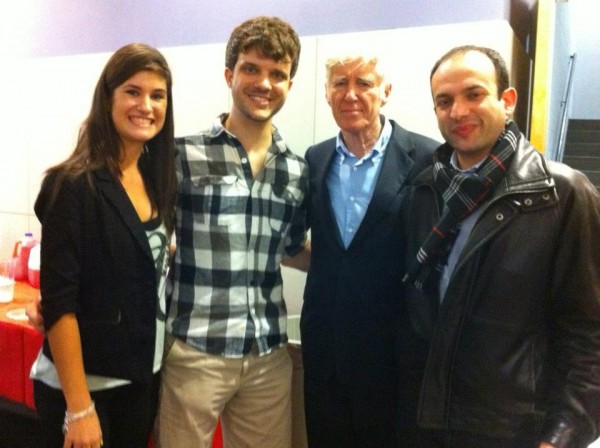 Dr. Daly noted in his heartfelt introduction that he thought of Lester Brown as an older brother, someone to be followed (“not like on Twitter”) in the field of economics. In the late 1950s and early 1960s when academic economics were entrenched in a “sterile formalism,”he said that Lester stuck with “substance,” focusing on the importance of things that were real, like soil, water, and food.
Dr. Daly noted in his heartfelt introduction that he thought of Lester Brown as an older brother, someone to be followed (“not like on Twitter”) in the field of economics. In the late 1950s and early 1960s when academic economics were entrenched in a “sterile formalism,”he said that Lester stuck with “substance,” focusing on the importance of things that were real, like soil, water, and food.
Throughout his productive career Daly had the opportunity to visit ministries of the environment around the world, where, he recounted, he would almost always see some Worldwatch and Lester Brown books on the shelves, generally looking well-used. In true form for an economist, Daly couldn’t resist measuring Lester's efficiency, which he calculated as a ratio of valuable output over costly input. With the output evident in citations “all over the place,” 50 books, 25 honorary degrees, and a number of apprentices mentored, divided by monetary input (looking at Lester’s institutional budgets, it’s “almost like dividing by zero!”) He then compared Lester’s near infinite efficiency to that of the World Bank: a ratio of minor accomplishments to a massive budget, not a promising figure.
Daly concluded his remarks with a fantasy vision of a statue of Lester on the University of Maryland campus. To bookend the existing statue of alumnus Jim Henson 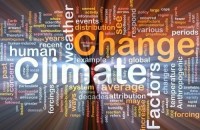 conversing with Kermit the Frog, he envisioned the inscription reading “It’s not easy being green, especially for an economist.”
conversing with Kermit the Frog, he envisioned the inscription reading “It’s not easy being green, especially for an economist.”
Thank you Dr. Daly, for such a thoughtful and kind introduction, and—most of all—for your tireless work in greening economics, institutions, and the world.
More than 200 people attended the standing-room only lecture. In his remarks, Lester spoke about his most recent book, Full Planet, Empty Plates: The New Geopolitics of Food Scarcity. He warned of the tightening margin between food production and fast-growing demand, noting that the major threats to security in the world today are not armed aggression or advanced military technologies, but climate change, population growth, food shortages, rising food prices, and spreading instability. He concluded by asking people to pick an issue that they felt strongly about—from the movement to close coal-fired power plants, to banning bottled water on college campuses—and get to work. “Saving civilization is not a spectator sport!”
Here’s hoping that more people take that message to heart.
Best,
Janet Larsen
Herman Daly’s article, “From a Failed Growth Economy to a Steady State Economy,” can be read in Solutions Journal.
Tuesday, November 13, 2012
One of the many things we love about Lester Brown’s Full Planet, Empty Plates is its readability. The book is only 160 pages with graphs and tables to provide visuals of the discussion. In his review, Jeff McIntire-Strasburg of Sustainablog wrote, “As with all of Brown’s books, Full Planet, Empty Plates is very well-documented: over 150 data sets accompany the book. Brown fully explains the extent of food challenges in various regions of the globe, and the potential impacts based on environmental and socioeconomic factors in these regions.”
As we said last week, we at Earth Policy Institute like to offer an array of options for our research to reach as wide an audience as possible. Here are a few quick facts to get you thinking about the global food crisis:
-
There will be 219,000 people at the dinner table tonight who were not there last night—many of them with empty plates.
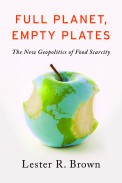
- As a result of chronic hunger, 48 percent of all children in India are undersized, underweight, and likely to have IQs that are on average 10-15 points lower than those of well-nourished children.
- Food prices are rising dramatically. The U.N. Food Price Index in June 2012 was twice the base level of 2002-04.
- More than half the world’s people live in countries where water tables are falling as aquifers are being depleted.
- A startling 80 percent of oceanic fisheries are being fished at or beyond their sustainable yield.
- Between 2005 and 2011, the amount of grain used to produce fuel for cars in the United States climbed from 41 million to 127 million tons—nearly a third of the U.S. grain harvest.
- In 2011, China consumed 70 million tons of soybeans, 56 million of which had to be imported. Almost all went into livestock feed.
- Today, with incomes rising fast in emerging economies, there are at least 3 billion people moving up the food chain, consuming more grain-intensive livestock and poultry products.
- Data for India indicate that 175 million people are being fed with grain produced by overpumping. For China, there are 130 million in the same boat.
- In Ethiopia, a prime target for foreign land acquisitions yet also a major food aid recipient, an acre of land can be leased for less than $1 per year.
- The 464 land acquisitions identified by the World Bank in 2010 totaled some 140 million acres—more than is planted in corn and wheat combined in the United States.
- It’s not all bad news: 44 countries have reached population stability as a result of gradual fertility decline over the last several generations.
Even quicker is the video of Brown himself discussing the main issues raised in the book.
Enjoy!
Julianne
Monday, November 05, 2012
The written word is a wonderful way to communicate ideas, but to reach out as widely as possible, we at Earth Policy Institute like to offer an array of options for our research.
Take a look at this five-minute video where Lester Brown speaks on some of the major topics covered in Full Planet, Empty Plates.
We have also uploaded two Power Point presentations providing graphic and textual highlights from the book.
And we are working on short video clips on some of the specific issues raised in the book.
Happy viewing!
Cheers,
Reah Janise Kauffman




